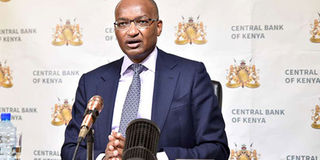Sh29bn loaned out to key sectors to boost growth

Central Bank of Kenya Governor Patrick Njoroge speaks at a press conference in Nairobi on April 30, 2020. PHOTO | FILE | NATION MEDIA GROUP
What you need to know:
- CBK Governor Patrick Njoroge notes that Kenya’s banking sector remains stable and resilient, with strong liquidity and capital adequacy ratios.
- The repayment period of personal or household loans amounting to Sh102.5 billion had been extended by the end of April.
Some Sh29.1 billion has been loaned to various sectors in the economy after the Central Bank of Kenya reduced the amount of money lenders must keep with the regulator.
The CBK lowered the Cash Reserve Ratio (CRR) in March — effectively releasing Sh35.2 billion to the banking sector, an amount that continues to be transmitted through the economy.
The banking sector regulator says to date, 82.6 per cent of the funds, translating to Sh29.1 billion, have been channelled to support lending, especially to the tourism, transport and communication, real estate, trade and agriculture sectors.
In addition, to providing relief to borrowers, the repayment period of personal or household loans amounting to Sh102.5 billion had been extended by the end of April.
CBK Governor Patrick Njoroge notes that Kenya’s banking sector remains stable and resilient, with strong liquidity and capital adequacy ratios.
However, the ratio of gross non-performing loans (NPLs) to gross loans rose to 13.1 percent in April, compared with 12.5 percent in March.
“This was due to increased NPLs in the real estate, trade and manufacturing sectors following a further slowdown in economic activity in these sectors,” Dr Njoroge said, as he explained the factors the monetary policy committee looked at before retaining the benchmark rate at seven per cent.
E-WALLETS
Dr Njoroge notes that waiving charges on mobile money bank account to electronic wallet transfers have seen the average number and value of bank to e-wallet transactions increase by 488,000 transactions per week, valued at ShS166 million.
“Banks have continued to operate smoothly across the country throughout the pandemic period, serving customers both from branches and digital channels,” he said.
The Monetary Policy Committee (MPC) met on May 27 against the backdrop of the continuing global Covid-19 pandemic, and measures taken by authorities around the world to contain its spread and impact.
The MPC assessed the economic impact so far, and the outcomes of its policy measures that were deployed in March and April to mitigate the adverse economic effects and financial disruptions.
Dr Njoroge said overall inflation is expected to remain within the target range in the near term.
“This is supported by the improving food supply due to favourable weather conditions, lower international oil prices, the impact of the reduction of VAT and muted demand pressures,” he added.
He noted that the private sector credit grew by nine per cent in the 12 months to April. This growth was observed mainly in the following sectors: manufacturing (20.1pc), trade (10.3pc), transport and communication (9.1pc), building and construction (7.7pc), and consumer durables (19.6pc).




